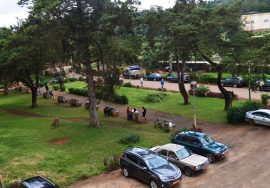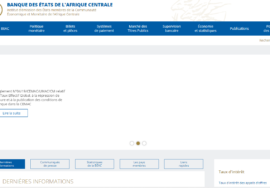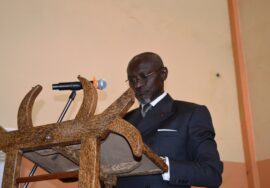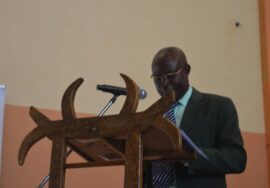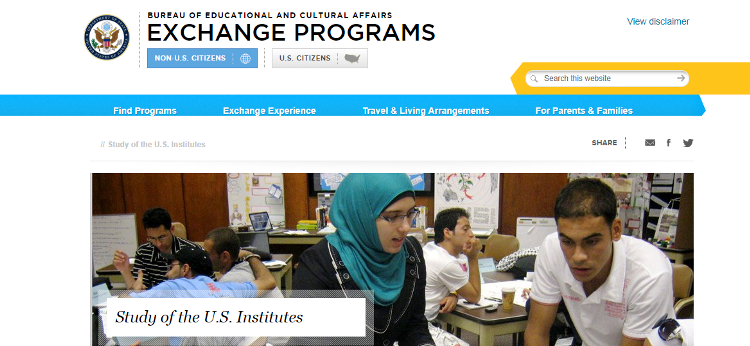
Study opportunities in US
Notice of Study Opportunity for Cameroonian Scholars
Dschang,UDs/SIC-05/12/19. The Vice-Chancellor informs the university community that the Public Affairs Section of the U.S. Embassy in Cameroon announces an open competition to recruit qualified scholars to participate in the Study of the U.S. Institutes for Scholars (SUSI) which will take place at various colleges, universities, and academic institutions throughout the United States over the course of six weeks beginning in or after June 2020. Each Institute includes a four-week academic residency and up to two weeks of an integrated study tour to another region of the United States. To obtain general information about the Institutes, prospective applicants are encouraged to visit this website: http://exchanges.state.gov/susi. The Study of the U.S. Institutes for Scholars will be on the following themes in U.S. Studies: American Culture and Values; Journalism and Media; Religious Freedom and Pluralism; U.S. Economics and Business; U.S. Foreign Policy; and Youth, Workforce Development, and Closing the Skills Gap.
Institute Themes:
The Institute on American Culture and Values will provide a deeper understanding of U.S. society, civil society institutions, democratic principles, human rights, and the rule of law. The Institute will examine the concepts of American exceptionalism and American resilience through social, economic, political, and religious contexts in which, historically, various cultures have manifested and shaped contemporary U.S. culture, values, and society.
The Institute on Journalism and Media will provide a deeper understanding of the roles that journalism and the media play in U.S. society. The Institute will examine the role of journalists in recognizing and preventing disinformation and will explore strategies for media and information literacy to counter disinformation. Additionally, the Institute will examine best practices in journalism by discussing the rights and responsibilities of the media in a democratic society, including editorial independence, journalistic ethics, legal constraints, and international journalism. The Institute will also examine pedagogical strategies for teaching students of journalism the basics of the tradecraft: researching, critical thinking, reporting, interviewing, writing, and editing. The program will also highlight the impact of technology in journalism, including the influence of the Internet, globalization of the news media, and other changes that are transforming the profession.
The Institute on Religious Freedom and Pluralism will provide a deeper understanding of U.S. society and culture, past and present, through an examination of religious freedom as a foundational American value. The program will include a survey of the religious landscape of the United States, including major and minor religious groups, historic religious traditions and contemporary American religious groups. The Institute will explore both the historical and contemporary relationship between church and state in the United States; examine interfaith understanding and dialogue, religious pluralism, freedom of religion as a fundamental unalienable human right and source of stability; and discuss ways in which religious freedom is protected.
The Institute on U.S. Economics and Business will provide a deeper understanding of key components and structures of the U.S. economy as the world’s largest economy. The program will explore how financial institutions, investors, and businesses interact to support growth and employment and the institutional backdrop that is required to sustain a competitive and strong private sector, including but not limited to corporate governance structures, monetary policy, and the legal and regulatory framework of the business sector.
The Institute on U.S. Foreign Policy will provide a deeper understanding of new approaches to U.S. foreign policy and how U.S. foreign policy is formulated and implemented. The Institute will include a historical review of significant events, individuals, and philosophies that have shaped U.S. foreign policy. The Institute will explain the role of key players in U.S. foreign policy including the executive and legislative branches of government, the media, the U.S. public, think tanks, non-governmental organizations, and multilateral institutions. The program will also examine the current U.S. foreign policymaking and the new trends that are shaping policy.
The Institute on Youth, Workforce Development, and Closing the Skills Gap will provide a deeper understanding of how new socioeconomic trends have changed the concept of work, workforce development, and career paths in the United States. The academic program will include a thorough discussion of the role of U.S. educational institutions, particularly community colleges, in preparing Americans with the skills needed to succeed in multiple industries including business, technology, science, the creative arts, and other emerging fields.
Candidate description and qualifications:
Priority will be given to candidates who have firm plans to enhance, update or develop courses and/or educational materials with a U.S. studies focus or component; who have no prior or limited experience in the United States; and who have special interest in the program subject areas as demonstrated through past scholarship, accomplishments, and professional duties. Candidates should be mid-career, typically between the ages of 30-50, highly motivated, experienced scholars and professionals generally from institutions of higher education or research focused organizations.
Candidates must demonstrate English language fluency. Institutes are rigorous and demanding programs. Participants will be expected to handle substantial reading assignments in English and to fully and actively participate in all seminar and panel discussions.
Submitting Candidatures: Interested applicants must submit in English a curriculum vitae and a statement/personal essay of two pages conveying why the applicant is interested in participating in the selected Institute, what s/he expects to gain from the experience, what s/he will bring to the program, and how s/he will leverage the experience to achieve any of these other potential outcomes :
- Update existing course
- create new course
- create new degree program
- school/university curriculum redesign
- national curriculum redesign
- new publication
- government or ministry policy
- new professional organization
- new institutional linkages
- professional promotion
- new research project
- raise institutional profile.
Please send applications electronically to ExchangesYaounde@state.gov, no later than midnight Cameroonian time on January 5, 2020. Late applications will not be considered.
